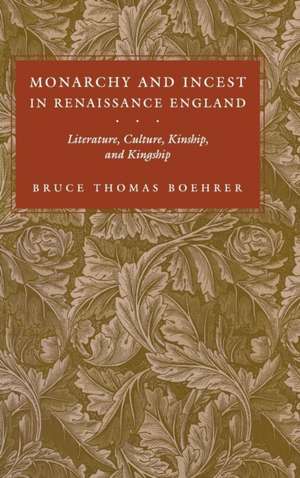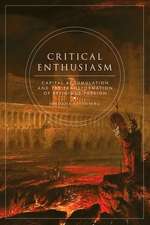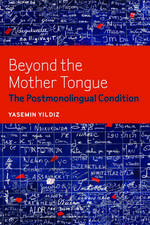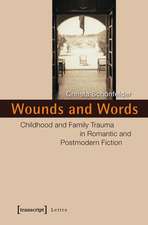Monarchy and Incest in Renaissance England – Literature, Culture, Kinship, and Kingship: New Cultural Studies
Autor Bruce Thomas Boehreren Limba Engleză Hardback – 28 apr 1992
Din seria New Cultural Studies
-
 Preț: 195.95 lei
Preț: 195.95 lei -
 Preț: 247.43 lei
Preț: 247.43 lei -
 Preț: 293.79 lei
Preț: 293.79 lei -
 Preț: 161.34 lei
Preț: 161.34 lei -
 Preț: 192.86 lei
Preț: 192.86 lei -
 Preț: 245.25 lei
Preț: 245.25 lei -
 Preț: 241.52 lei
Preț: 241.52 lei -
 Preț: 197.18 lei
Preț: 197.18 lei -
 Preț: 246.99 lei
Preț: 246.99 lei -
 Preț: 158.26 lei
Preț: 158.26 lei -
 Preț: 191.40 lei
Preț: 191.40 lei -
 Preț: 433.78 lei
Preț: 433.78 lei -
 Preț: 266.14 lei
Preț: 266.14 lei -
 Preț: 437.65 lei
Preț: 437.65 lei -
 Preț: 464.17 lei
Preț: 464.17 lei - 11%
 Preț: 447.22 lei
Preț: 447.22 lei - 11%
 Preț: 445.13 lei
Preț: 445.13 lei -
 Preț: 434.93 lei
Preț: 434.93 lei -
 Preț: 470.91 lei
Preț: 470.91 lei -
 Preț: 404.34 lei
Preț: 404.34 lei -
 Preț: 440.53 lei
Preț: 440.53 lei -
 Preț: 462.64 lei
Preț: 462.64 lei -
 Preț: 467.44 lei
Preț: 467.44 lei -
 Preț: 324.74 lei
Preț: 324.74 lei -
 Preț: 403.19 lei
Preț: 403.19 lei -
 Preț: 244.81 lei
Preț: 244.81 lei
Preț: 432.25 lei
Nou
Puncte Express: 648
Preț estimativ în valută:
82.71€ • 86.58$ • 68.84£
82.71€ • 86.58$ • 68.84£
Carte tipărită la comandă
Livrare economică 31 martie-14 aprilie
Preluare comenzi: 021 569.72.76
Specificații
ISBN-13: 9780812231342
ISBN-10: 0812231341
Pagini: 224
Dimensiuni: 152 x 229 x 15 mm
Greutate: 0.46 kg
Editura: MT – University of Pennsylvania Press
Seria New Cultural Studies
ISBN-10: 0812231341
Pagini: 224
Dimensiuni: 152 x 229 x 15 mm
Greutate: 0.46 kg
Editura: MT – University of Pennsylvania Press
Seria New Cultural Studies
Textul de pe ultima copertă
In dissolving his marriage to Catherine of Aragon, Henry VIII claimed that Catherine's brief marriage to Henry's deceased brother, Arthur, had rendered the subsequent union incestuous. Henry's next marriage could be called incestuous as well, for Anne Boleyn's sister Mary had been the king's mistress before her. But early rumor hinted at an even darker incestuous connection between Henry and Anne; she was, some charged, not only the king's lover, but his illegitimate daughter. Monarchy and Incest in Renaissance England argues that a preoccupation with incest is built into the dominant social and cultural concerns of early modern England. Proceeding from a study of Henry VIII's divorce and succession legislation through the reigns of Elizabeth I, James I, and Charles I, this work examines the interrelation between family politics and literary expression in and around the English royal court. Boehrer contends that themes of incest appear irregularly and prominently in the imaginative literature of the period. Some fifty extant plays from 1559 to 1658 deal either explicitly or implicitly with the subject. Incest emerges as a structural motif in texts as diverse as The Faerie Queene and Paradise Lost, and figures at least implicitly in nondramatic works by Jonson, Chapman, Shakespeare, and others. Monarchy and Incest in Renaissance England explores the response to, and modification of cultural anxieties regarding family structure. It is a brilliant and original work that will be of interest to scholars and students of English Renaissance literature and history, as well as of cultural studies.











